
BY STEPHANIE JENSEN
The Center for Infectious Disease Research and Policy states that job losses from COVID-19 are higher than they were during the Great Depression. Many industries are affected by the pandemic, including the music industry. Some are even predicting the music industry, specifically live music, will be changed forever.
All of the tours have been canceled this year, and unfortunately, bands can’t get by on album and merch sales alone. Taking away touring is equivalent to taking away a musician’s livelihood. The touring loss also affects crew members, such as tour managers, techs, front of house, merchandising managers, drivers, lighting professionals, and more. On top of that, it doesn’t seem like this pandemic is easing anytime soon.
Because of this, musicians and touring professionals might need to find a job or a side gig to make some much needed money.
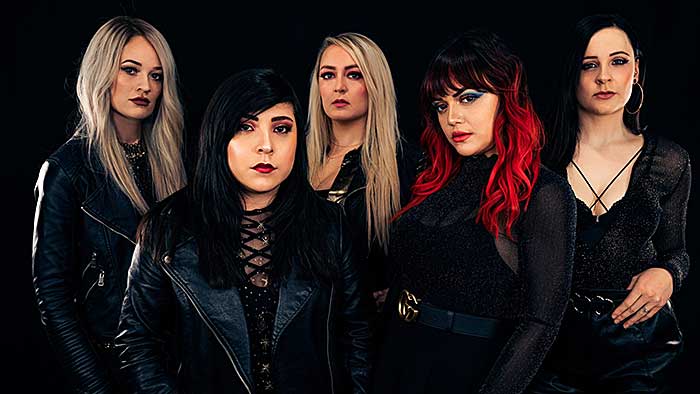
No one understands the impact of this pandemic better than Conquer Divide guitarist Kristen Sturgis. “I work as a critical care nurse at a level one trauma center. I was working in a COVID-19 ICU when we got hit hard with the pandemic,” she explains. A more in-depth account of her experience is here. her experience here.
COVID-19 has hit the economy terribly, and there are few jobs available. Fortunately, musicians still have options to gain some work.
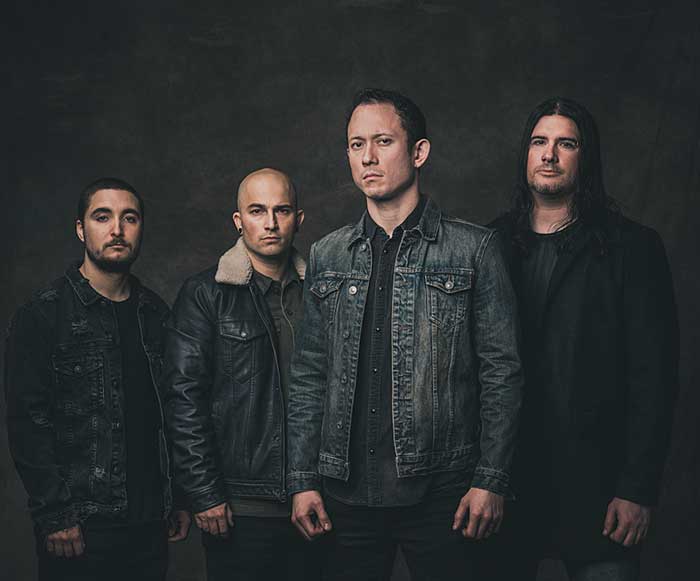
Many of your favorite artists stream on the video platform Twitch, such as Trivium’s Matt Heafy—he’s really become passionate about the platform. “Being able to still provide for our supporters has been fantastic for my audience and my well being. Since the beginning of this, I have been a champion of the term ‘physical distancing’ and pushing to remain ‘socially connected’ so that people don’t lose their sense of community. My channel is a gym, therapist couch, pub, coffee shop, local club—whatever our fans need it to be. Being able to make them feel good, does the same for me.”
“BEING ABLE TO STILL PROVIDE FOR OUR SUPPORTERS HAS BEEN FANTASTIC FOR MY AUDIENCE AND MY WELL BEING.”
He continues, “It’s about being live in the moment. It’s about streamers and viewers being directly connected and being able to converse in real time. The thing the channel loves the most, of course, is me playing the Trivium songs of their choice. We also will select covers from the viewers. I’ll work on music [original and new] and play games. It’s all about doing what feels the best for the streamer, and the viewers will, in turn, feel that back.”
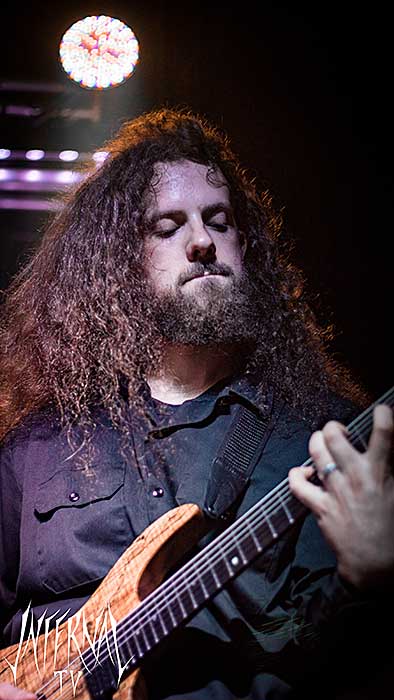
Rivers of Nihil’s Brody Uttley is also a major Twitch user. He loves the community and the support from his followers. “More than anything, I would say that streaming has given me the opportunity to take my mind off of the dark times that we are living through. Getting involved in the technical side of learning how to properly broadcast a live practice or mixing session has eaten up a lot of hours in my week, which is actually a good thing. The fact that six months ago I had no idea how to do this and now I’m mildly okay at it is also a feel good thing for me, mostly because I feel like I’ve made progress in a time when I’m not able to make the kind of progress that I want to make due to COVID-19. The community on Twitch is also great—incredibly kind and supportive people from what I have seen thus far. Unlike most other social media platforms where people are constantly screaming at each other, it seems like the Twitch community is mostly focused on building a little corner of helpfulness and positivity in the world. Any time I have a technical issue, someone always helps me out in the chat right away. Really cool.”
Dave Davidson of Revocation and Gargoyl is one of the latest musicians to join Twitch. “Twitch has definitely been a learning experience. It’s a very interesting platform and it’s an interesting way to connect with the fans. It seems like the audience is a little bit more of a younger generation. I feel like with every generation, there’s a new up-and-coming social media platform that people flock to. But it’s also a mixed bag, and I haven’t been on there that much,” he explains.

You may be interested in starting your own Twitch channel, or have already started one and are experiencing difficulties—you’re not the only one. “The most difficult thing for me was getting over the technological hurdle because it’s a whole bunch of software you need to download, you need to make sure you have a good webcam, and all of these different things. The computer of your hardware has to be connected to the software in the right way so you can stream on Twitch and there won’t be any issues. Definitely ran into a couple of snags in the beginning because it was all foreign to me, but I’m happy to say I got it up and running now,” says Davidson.
“I would definitely suggest finding someone who is already streaming and modeling your technical side of things—camera, software, etc.—off of their setup initially. It’s easier to diagnose problems that way. I made the mistake of browsing YouTube and forums for advice, and nothing really seemed to work for what I was trying to do. As soon as one issue would be solved another one would pop up. Luckily, I had a few friends that were doing it and by talking to them I was able to piece together a pretty clear picture of what I needed to do to get up and running. And trust me, I’m still learning. Also, I would generally say that you should have patience with it. There is a lot to learn and streaming is still a pretty new platform with lots of issues. It’s easy to get frustrated and want to give up, but once you’ve got it up and running things begin to smooth out and you learn as you go,” explains Uttley.
Should musicians start a Twitch for financial reasons? “The best advice I have is not to start a Twitch with the goals of profit. I started a Twitch originally because I wanted yet another place and layer that I can give back to our fans. Trivium has never been a press band or a band’s band. We’ve purely been championed by our fans and our fans only. So, I felt Twitch would be yet another way I can stay in touch and give back to them. There is no paywall on my channel and no forced monetary component. It’s purely optional. Get on it because you want to be connected, create community, and continue strengthening your relationship with your audience. The rest will follow,” Heafy explains.
“JUST LIKE ANYTHING ELSE IN THE ARTS, YOU HAVE TO FIND YOUR NICHE AND THE PEOPLE WILL EVENTUALLY COME.”
Uttley thinks if you are starting Twitch for financial gain, you should at least give your followers the content they deserve. “I’ve only been doing this since May, so I don’t really have a huge amount of advice to give on this front. However, I would say staying consistent is a pretty big key factor. Even on weeks where I am really busy, I try to get at least one stream in. If people are paying money to subscribe to your channel, they want to know that they are getting something for their money. Human beings are inherently attracted to repetition, so if you broadcast on the same day every week, it’s easier for people to work your stream into their schedule. Also, try to take notes on what works and what doesn’t. I’ve definitely done streams where I was thinking people are going to love this and they definitely haven’t, just based on the numbers. It’s pretty easy to see what works and what doesn’t since Twitch sends you a stream summary after every stream.”
Uttley continues, “Just like anything else in the arts, you have to find your niche and the people will eventually come. The best comparison that I’ve heard was from Vince [Edwards] at Metal Blade Records. He told me, ‘Twitch is kind of like Instagram. You can make your Instagram into a reflection of your personality and people will show up eventually.’ I like that comparison because I always thought that I had to be super corny to be a streamer. I always thought that I had to be the ‘hey don’t forget to like, subscribe, and smash that button!’ guy, but it turns out I can just be me and people seem to respect the honesty.”
There are also plenty of career opportunities in the music industry. Most musicians teach music and not only utilize their skills and passion, but give back and teach others how to play music. Some artists have said their teaching schedule got filled up very quickly since everyone is staying at home.
“YOU GET TO INTERFACE WITH REAL HUMAN BEINGS, EVEN THOUGH IT’S DIGITAL. IN TODAY’S DAY AND AGE, IT’S HARDER TO HAVE THOSE INTERACTIONS.”
Dave Davidson is a great example. When asked if his teaching schedule has been busy, he said, “Yeah, it’s been busy. I’m not sure if it’s because of the quarantine. People are just home and wanting to learn. I’ve got a good roster of students right now. I was teaching before quarantine ever happened. I’ve been teaching for almost 20 years at this point. I have a bunch of students, some of them have been with me for years and others have been with me since the pandemic hit. It’s been keeping me busy, which is nice. And it’s cool, too, because even though it’s over Skype or the internet, you get to interface with real human beings, even though it’s digital. In today’s day and age, it’s harder to have those interactions. Even talking to someone on Skype is good for your mental health. You’re not cooped up and not seeing anybody.”
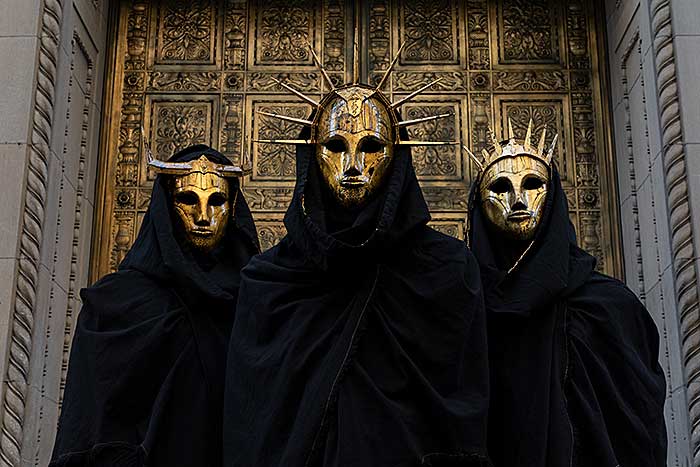
Zachary Ilya Ezrin of Imperial Triumphant is also a guitar teacher. Regarding his teaching schedule, he said, “It’s pretty much the same, but with just different students coming in and out. However, it definitely allows for a wider spectrum of students since I can now teach anyone who has an internet connection.”
Davidson also came up with an innovative idea by using his website to sell teaching materials. “My website was something I’ve been meaning to make for a while now. Once the pandemic hit, I wanted to stay as productive as possible. Even though I wasn’t going to be touring or doing anything like that, I figured it would be a great time to work on my website. I had my buddy make it for me. I gave him a lot of input and direction about how I wanted it to look. The biggest challenge for me was to compile all of my material. A big reason for launching the website was to have a platform for different teaching materials I have for sale. When I teach privately, I amass a bunch of different handouts that I’ve created over the years to give to students. I figured, if I launch a website, even some of those who don’t want to take a lesson with me but they want to learn in a different capacity, they can download a lesson bundle. I took the different worksheets I had over the years and added to them, creating an over 120 page lesson packet that’s available for download. That took some time to create exercises for and make sure everything was looking good, crisp, and clean. That was what I was doing on my end, and then the guy who was making the website was doing the coding for it and making it look pretty. I’m happy to say it https://www.davedavidsonguitar.com/ launched more than a month ago, and I’ve been getting a lot of traffic so far. So, that’s been another good way to supplement income while you’re at home, a way to either have people reach out to you to book lessons or to have materials for sale on the website that they can just do a direct download to someone’s email.”
“WE’RE ABLE TO TEACH STUDENTS ABOUT A WIDE VARIETY OF LESSONS INCLUDING ADVANCED THEORY AND GENRES OUTSIDE OF METAL.”
To gain more students, Ezrin recommends focusing on theory and other genres of music as well as giving lessons in music topics outside of playing. “We’re all lucky enough to have formal musical educations, so we’re able to teach students about a wide variety of lessons including advanced theory and genres outside of metal. If a musician doesn’t have this training and still wants to teach, I would encourage them to give lessons in navigating the music industry. That wisdom, that we all learn on our journey through the machine, can often be even more beneficial to a young aspiring player,” he says.
Teaching music isn’t your only option. Conquer Divide drummer Samantha Landa proves this. “I work as a content manager and writer for Drumeo,” she explains. Drumeo is an online platform that provides drum lessons.
As far as starting your own business, you might be surprised at how many of your favorite artists have their own business, many of which are in the music industry.
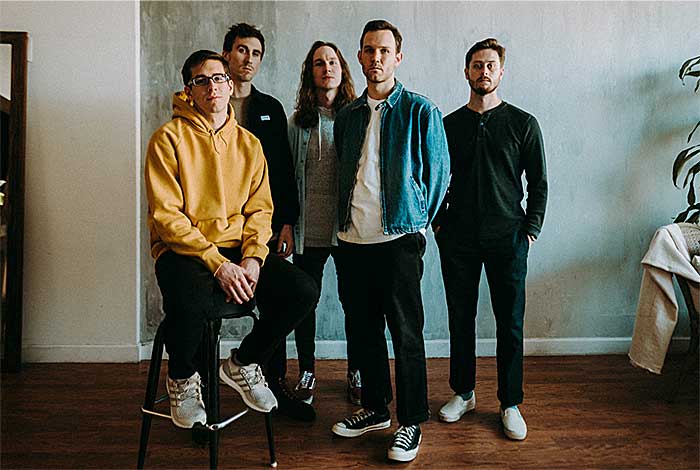
For example, Nick Casasanto of Knuckle Puck makes custom guitar pedals. “It all started back in October of 2019 when my cousin Mike, who is an electrical engineer, asked me if I had ever thought about building a guitar pedal. Before then I had been interested in electronics and was no stranger to using a soldering iron or installing a new pickup in my guitar. Mike and I were having coffee after a night out when we just started snowballing ideas about developing a guitar pedal. His professional experience manufacturing products meshed perfectly with my interest and knowledge of music gear. From that point forward, I became obsessed with the idea and began building pedal clone kits and reading as much as I could to gain a more technical understanding of circuitry. After building several pedal kits, spending countless hours on the phone with Mike, and tweaking different circuits together, things started to click. Eventually I gained a good enough grasp of electronics that I became able to build pedals on my own without a pre-packaged kit or instructions.”
Like many of the artists mentioned, Casasanto is able to pursue his business while on tour. “I would spend the long drives on tour reading books about basic electronics and scrolling through the r/diypedals subreddit. Those resources would spark ideas that would incubate in my mind while on the road. Those ideas would then propel me to order parts that when I came home to after tour would turn into pedals.”
“I’VE EXPERIENCED SO MUCH POSITIVE PERSONAL GROWTH DURING THIS PANDEMIC.”
Casasanto’s business has been successful during the pandemic, and he’s achieved more growth in other life endeavors. “I’ve experienced so much positive personal growth during this pandemic. I absolutely love what I do and never want to stop touring or playing music with my friends, but I’m the type of person who is always falling into new hobbies. All the extra time has given me the opportunity not only to pursue these hobbies, but also to combine my skills and interests in ways I never thought of before. I’ve been challenging myself to come out of this pandemic better than I went in, whether that means getting better at piano, furthering my understanding of music theory, or building better quality guitar pedals. The added pressure of being ‘out of a job’ has definitely forced me outside of my comfort zone in ways that have been incredibly beneficial to my entrepreneurial spirit. Pandemic or not, I like to make use of my time.”
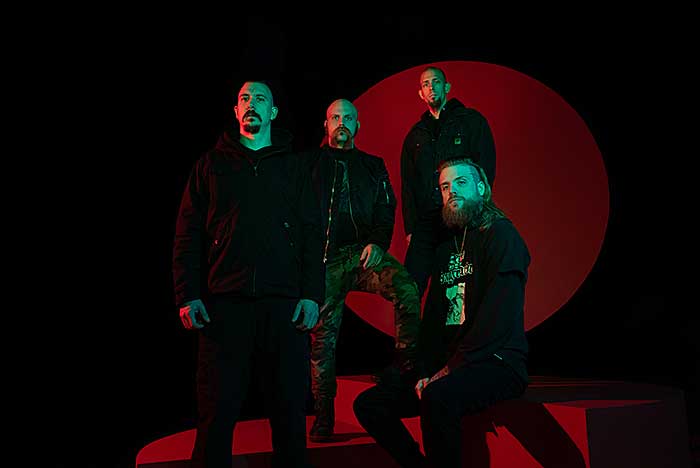
If you’re not a tech person, musicians can also make other music gear, such as guitar straps. That’s what Vitriol’s Kyle Rasmussen does. His company, Steel Weather, makes guitar straps with enormous metal spikes.
“I was looking for a creative outlet outside of Vitriol where I could contribute to the cultures I care about. I found myself at a point of conflict when I felt that indulging my general ambition through the band risked undermining the intentions of Vitriol. When the pandemic struck, it was that ‘put up or shut up’ moment for materializing that project. My partner Sofia and I were excited about the idea of collaborating creatively, and we had been looking for a way to give back to the metal community. Steel Weather is our attempt at doing that,” explains Rasmussen.
Lots of special care goes into making Steel Weather guitar straps. “The spiked guitar straps we offer as our flagship product are highly labor intensive. They are made entirely by hand from the ground up. Because of this, Sofia and I are only able to craft a small amount every week. Our offerings being so low volume makes Steel Weather very pandemic-friendly. Arming a select few with superior anti-viral firepower,” he says.
“PEOPLE RESPOND WELL TO PASSION, AND IT HAS BECOME THE ELEMENT I TRUST MOST IN ANY ENDEAVOR”
Overall, a business idea should be more of a passion rather than a have “I have to do this as a job” mentality. “Think of something that would excite you if you saw it being offered by another member of your community, and then offer it! It is easy to become caught up trying to provide things to people you think they might want, but I’ve experienced more success when pursuing the ideas that excite me the most. I find that people respond well to passion, and it has become the element I trust most in any endeavor,” Rasmussen explains.
Kristen Sturgis started her own music marketing and advertising company. “I’ve taken skills that I’ve learned throughout my music career and started a company called Music Marketing Pros where I help other artists advertise their song or album releases. We also offer monthly advertising. It’s been a great avenue to network and help out fellow artists because there is such a steep learning curve with advertising. This way they focus on the important stuff like writing music and touring.”
One of the positives about this pandemic is that it’s creating new band merch demands, such as face masks. Revocation has had success selling face masks. “That was pitched to us by Karim, who is the president of Night Shift Merch, which is our new merch company. It’s been great working with Karim. He has a lot of cool ideas. He’s a really hard-working dude and has been in the scene forever. I remember going on tour with him—it’s probably been 10 years ago at this point. He’s a super rad dude. He saw this need in the market that needed to be filled and said, ‘Hey would you guys ever consider doing this?’ And we’re like, ‘Yeah, fuck it!’ People are going to have to wear face masks. If they want rock band merch on their face masks, then that’s great for us. It’s a cool specialty item that we initially first put out and they sold out right away. So, now we’re doing another generation of the mask and will probably be selling some face masks for quite some time,” says Davidson.
“WE WANT TO SHARE THE X-RAYS OF WHAT OUR MUSIC IS MADE OF AND EXPLAIN THAT HOW WE PLAY IS MUCH MORE COMPELLING”
Since more musicians are focusing on their craft, this is a great time for bands to release tab books. Imperial Triumphant is one of the many bands that are doing just that. Zachary Ilya Ezrin believes, “Bands should do whatever they want. For us, we want to share the X-rays of what our music is made of and explain that how we play is much more compelling than just what we play. Hopefully, it can inspire something even wilder.”
Many artists recommend utilizing other skills in the music industry as well as in their professional working career. “It’s a huge asset to have digital skills in this day and age, especially as a musician. If you can write, do graphic design, web development, social media, anything like that, you can do all of this for your band. Or, if you’re looking to turn those skills into online work, you can offer these services (or consulting and video courses) to other artists, labels, or businesses. Freelancers are usually in high demand, and more companies are starting to hire remote employees, as well. This type of work is remote and often flexible, so it’s ideal for musicians, pandemic or not. You might also have skills you don’t know about. Do you like talking to people? Are you really organized? Do you have experiences people would pay to hear about? Think about avenues where you could use these natural skills, set goals, and work towards them, even if it means creating a new type of job,” explains Samantha Landa.
Dave Davidson agrees, “I think the biggest thing is to try and stay creative and think about different needs in the marketplace that you can fill with your own particular skill set.”
Nick Casasanto of Knuckle Puck concurs that skills outside of the music industry will benefit your business side in the music industry, and everyone should focus on working hard and bringing others up.
“There are so many ways to be involved in music behind the scenes. My advice to those people would be to think of something you enjoy doing and just start doing it…a lot. Ask yourself what you’re skilled at naturally and how those skills can bring value to a business/band. If there’s no inherent value, no one will pay you for it. Find a community for that thing whether it’s in your local music scene or a subreddit. Don’t wait for someone to point you in the right direction and don’t ask for anyone’s permission. The more you do something because it’s what you want to be doing, the better you’ll become. Good work ethic speaks for itself and attracts people to you, and if you enjoy doing it, it’s not really work! Become a person who brings solutions to the table, not problems. Collaborate with everyone you can, learn from anyone who will let you listen, and read. Always be reading a book that will give you insight to further your understanding of the industry/job you’re trying to pursue. Lastly, always encourage and lift up those around you. What goes around comes around.”

Your job doesn’t have to be in the music industry. Like many of the artists have already mentioned, you can utilize other skills. For example, many musicians are tattoo artists, such as Branson Hoog of Not a Toy and Samantha Mobley of Frozen Soul. Tattooing, however, is a skill that requires contact with clients and there are sanitation and disinfecting concerns—not an easy job to do while preventing the spread of COVID-19. “It’s different in different states. I live In Colorado and California. So, California has been closed down, so there are no tattoos, but Colorado’s been pretty chill. It’s less people and now you have to wear masks, but other than that it’s pretty normal. I think a lot of people are actually itching to get tattoos since there’s nothing else to do,” says Hoog.
“IT’S BEEN PRETTY ROUGH. I WAS UNEMPLOYED WITH NO INCOME FOR OVER NINE WEEKS.”
Mobley, on the other hand, has faced a few more difficulties. “It’s been pretty rough. I was unemployed with no income for over nine weeks. So, the first month, I worked for an entire month straight to catch up after I was allowed to start tattooing again. I have been working pretty much non-stop since the lockdown was lifted in Texas back in May. The general public has been quite difficult to deal with, honestly. There are people who aren’t willing to comply with the mask ordinances or the guest rules. Most of the general public is very bored and some have extra money right now. Most nighttime activities are closed in the state of Texas except for tattooing. So, you have people who wouldn’t normally get a tattoo, either because of money or their work schedule, coming in at all hours and being all kinds of disrespectful while you’re already tired and overworked. Also, supplies have been hard to get, too. It’s definitely been very trying and stressful at times, but I’m just glad I’m able to work for now,” she explains.
For prospective tattoo artists, Hoog advises to focus on what they love but to also know your limits. “I feel like artists that I’ve worked with have said, ‘You’re supposed to have one thing that is your thing that you specifically do,’ but I’ve always loved art. There’s so many ways to create compelling and emotional pieces, so I’ve never really boxed myself into one specific medium. There’s definitely some that I’m better at than others. I usually stay away from Japanese and tribal stuff, but outside of that, traditional tattoos are so much fun because it’s like an ode to how tattooing started. I love realism because that’s the type of art I did before I started tattooing. I really take pride in the fact that I enjoy all art styles.”
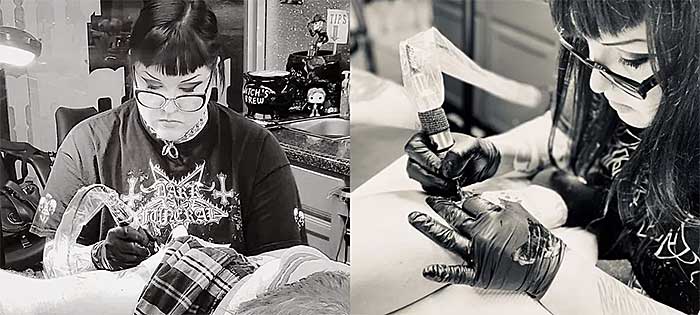
Mobley follows this same advice. “I try to do everything 100 percent custom for the client while still adhering to the confines of their original concept. I try to put a little piece of my personality in every tattoo. I love tattooing and that translates into my work pretty well. I like bold lines and bright colors. For now, I’m trying to be well versed in different styles, but that will take some time and more experience. I have only been tattooing for one year, and at least three of those months were gone due to touring, shows, and the lockdown this year. I have a bit of catching up to do. Right now, my preferred style is traditional tattooing or neo-traditional. I like anything Halloween or horror related, or pop culture, video game, and cartoon tattoos,” she says.
Getting a job as a tattoo artist isn’t easy. “It’s pretty hard to land an apprenticeship, let alone a decent one. Once you’ve gotten one, hard work, dedication, obsession, integrity, a good portfolio, and a willingness to swallow your pride are going to be the main focal points. The success part is up to your dedication. I believe if you truly love what you do, it will show through your work and you will be successful, however you choose to define that. Also, how much you’re willing to endure and how much you’re willing to sacrifice for the opportunity to tattoo as a career are going to be all up to you,” Mobley explains.
“It’s like any artistic career. There’s just got to be a shit ton of work ethic and drive, and if you want specifics, you have to get an apprenticeship and that kind of stuff. What I think an artistic career really comes down to is that you’ve got to have the passion and courage to stick with it for years, with it potentially not working until it actually does—just having the guts to stick with it,” explains Hoog.
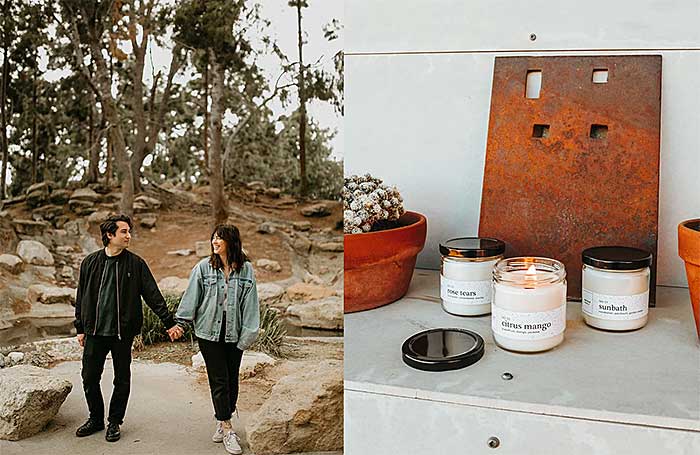
Austin Cressey of Movements owns a candle business. “In January, my girlfriend and I decided we wanted to make a candle company. We both are very into candles. I often make jokes about how everywhere you look in our apartment you see at least two to three candles. So, we decided to make our own and make the scents we always wanted to have. We got to work on learning how to make candles and creating the scents, as well as working on branding with the intent on launching in June.”
“MY GIRLFRIEND AND I DECIDED WE WANTED TO MAKE A CANDLE COMPANY. WE BOTH ARE VERY INTO CANDLES.”
While Cressey and his business partner/girlfriend faced some setbacks, they got their candle company off the ground and have already achieved success. “We had many challenges to overcome to get it off the ground. First off, the branding took a while to figure out. We both are graphic designers, so we had a lot of back and forth on what the name should be and what the candles looked like. In the end, we landed on Odd Bird Candle Co. We were stoked on the name and on the final labels and jars. Making the candles was also a huge challenge, and it took many hours and batches to get them right. The last hurdle we had to face was getting our supplies shipped to us. Due to the pandemic, we dealt with long shipping times and some supplies being out of stock. In the end, we managed to obtain everything we needed and launched our candles in June and sold out in two days! Now we are working on restocking and new scents.”
When touring comes back and musicians have to leave for several months out of the year, the key is to find a job that lets you take significant time off of work or where you can make your own hours. “I am fortunate enough to work a contingent nursing job where I make my own hours, and I can leave on tour for up to a month at a time. Luckily, we were able to record our music video just before the pandemic hit,” says Kristen Sturgis.
Samantha Landa has these same benefits working for Drumeo. “Because my work is completely online, it means I can do it from anywhere. I’ve worked on tour in Europe and I’ve worked from the set of a music video. As long as I have an internet connection and can meet my deadlines, it’s a great compromise.”
“SINCE I’VE BEEN TEACHING GUITAR, I’VE BEEN A LOT HAPPIER. IT’S BEEN AWESOME HAVING MUSIC IN MY DAY-TO-DAY LIFE”
Another Conquer Divide member, guitarist Isabel “Izzy” Johnson, works as a music teacher and as a bartender. “I’m actually pretty lucky in the sense that my jobs are super cool about me taking time off when I need to for touring and recording. Bartending used to be my only job, and since I’ve been teaching guitar, I’ve been a lot happier. It’s been awesome having music in my day-to-day life and working with Conquer Divide,” she explains.
When asked about how he coordinates his work as a tattoo artist and musician, Brandon Hoog says, “They go pretty hand in hand. Obviously, I can’t tattoo at home when I’m on tour, but so far being able to tattoo on tour has been actually some of the most fun sessions that I’ve done—when it’s green room tattoos, that kind of stuff. Probably less sanitary than it should be (laughs), but it’s an experience that you wouldn’t get in any other way.”
Samantha Mobley explains that organization is key. “I try to balance the two the best that I can. In my downtime from touring, I focus more on my tattoo career. When I have a bunch of shows lined up and upcoming tours, I try to work as much as possible tattooing beforehand. Then, I prebook appointments for the few weeks after tour, so that I can come back with everything already lined up and running smooth. Luckily, my tattoo shop is pretty understanding that touring is part of my job as a musician, so time off has never really been an issue.”
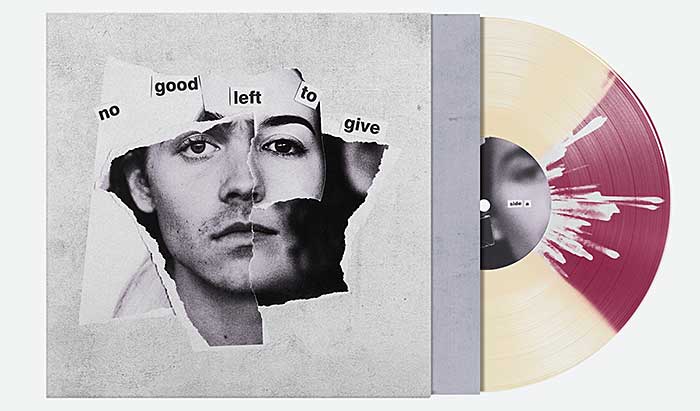
As long as you’re organized, managing a career in music and tattooing while touring is possible without setbacks. But what if you own a candle company? “Along with the candle company and the band, I’ve also been working a full-time job to pay the remainder of my bills. So, it’s been really hard to manage the band, job, and the company. It definitely gets overwhelming, especially with our new record No Good Left to Give coming out September 19. There is a lot of work that comes with releasing a new album. Since the pandemic, it’s been difficult to have to focus on multiple things at once since beforehand Movements was my only job. But in the end, Movements and Odd Bird Candle Co. are my passions, so I’m trying to make it all work,” Austin Cressey explains.
He continues, “Even when touring comes back, I’ll still be hustling Odd Bird Candles. Luckily, I have amazing partners to help with my endeavors—my bandmates and management on Movements, and my girlfriend on Odd Bird Candle Co. So, I can only see things getting bigger and better over time.”
When touring will be able to come back is anyone’s guess. Outburn has another piece on touring and the pandemic, and the day to expect regular tours and festivals keeps getting pushed back. Many musicians agree that this is a time to stay creative.
Des Rocs is the perfect example. He has taken this time to write music, produce, and he’s even filming acoustic performances.
“WHEN I’M STUCK AT HOME, ALL I CAN REALLY DO IS WRITE AND PRODUCE AND DO ALL OF THE THINGS I WOULD SAY WHEN I WAS ON TOUR”
“I really come from a place of never being able to sit down. When I’m out there on the road touring, that’s easy to satisfy because I’m physically moving nonstop. But when I’m stuck at home, all I can really do is write and produce and do all of the things I would say when I was on tour, like, ‘If I could just get home for a couple of months and not have to worry about not being on the road.’ And now I’m taking myself up on all of that thought,” says Des Rocs.
Dave Davidson agrees, “My advice is to try to stay creative. You can use this time to write music. Write so that you’re good to go. You can go to the studio and start recording an album. When the restrictions ease up, you’ll be ready to hit the road. Maybe you can do different studio work. As I mentioned, Twitch seems to be a platform that people are checking out. Home recordings, teaching, there’s a bunch of different avenues within music where you can still make money.”
One of the projects that Des Rocs did was film an acoustic performance of his single “Used to the Darkness” in Times Square, right before the lights turned out. “I really believe art is a reflection of a period in culture and a place in time. If I can use an acoustic performance or another kind of live performance to capture a moment in culture and help raise money for a good charitable cause like we did with the Times Square video, then to me, that’s a really exciting use of a gift that I get to enjoy,” he says.
Des Rocs sums it up best with, “Don’t compare yourself to others. You see a lot of what similar artists are doing out there, and it can freak you out because you think, ‘I should be doing that,’ or, ‘Why am I not doing this thing and that thing?’ You just need to take a moment, breathe, and understand that it’s okay to not be doing everything that everybody else is doing. And then once you’re in a calm and collected place, forge your own path and continue to create your own art the way that you want to.”




















